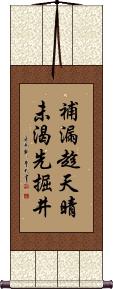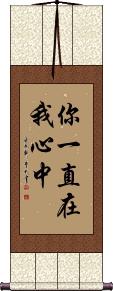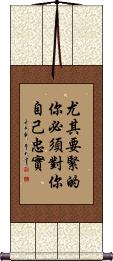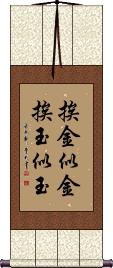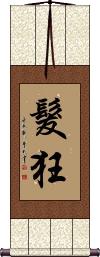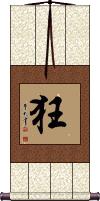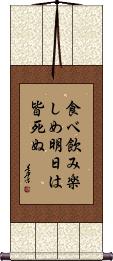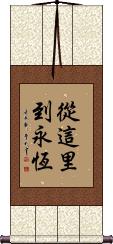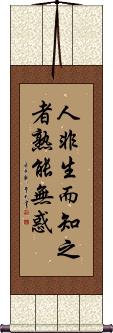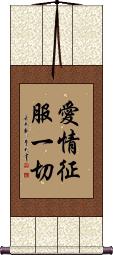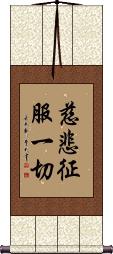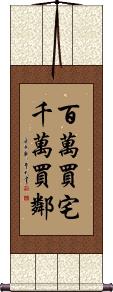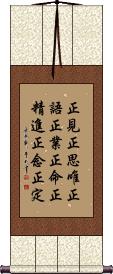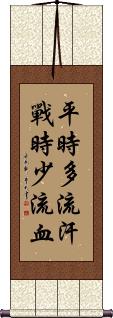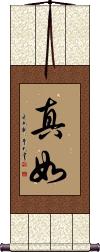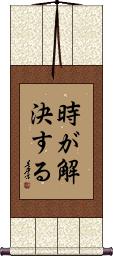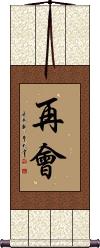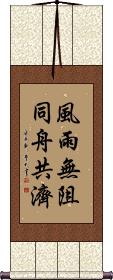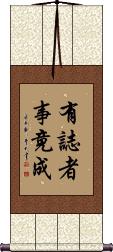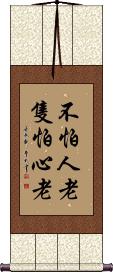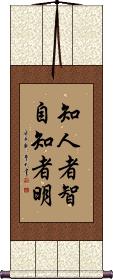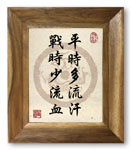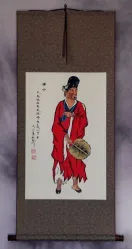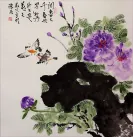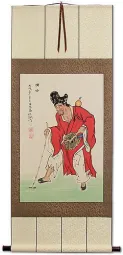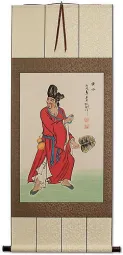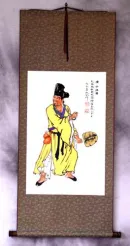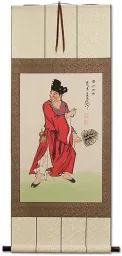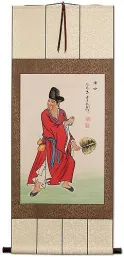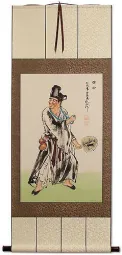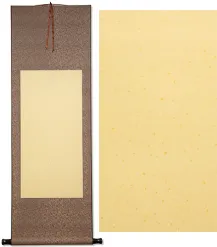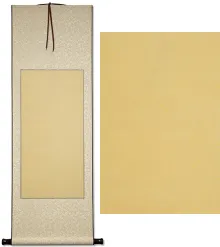Many custom options...
And formats...

Not what you want?
Try other similar-meaning words, fewer words, or just one word.
We Are All Mad Here in Chinese / Japanese...
Buy a We Are All Mad Here calligraphy wall scroll here!
Personalize your custom “We Are All Mad Here” project by clicking the button next to your favorite “We Are All Mad Here” title below...
Switched to secondary search mode due to lack of results using primary.
These secondary results may not be very accurate. Try a different but similar meaning word or phrase for better results. Or...
Look up We Are All Mad Here in my Japanese Kanji & Chinese Character Dictionary(My dictionary is a different system then the calligraphy search you just tried)
If you want a special phrase, word, title, name, or proverb, feel free to contact me, and I will translate your custom calligraphy idea for you.
2. Fix the roof before the rain; Dig the well before you are thirsty
4. ...And this above all to thine own self be true
5. You are always a beauty in your lover’s eyes
6. Brevity: Fewer Words are Best
7. You are who you hang out with
8. Crazy / Mad
10. Drain the pond to get all the fish
11. Eat Drink and Be Merry, For Tomorrow We Die
13. We are not born with knowledge, how does one achieve maturity?
15. Loving-Kindness Conquers All
16. A House Might be Worth 1 Million Dollars, But Good Neighbors are Worth 10 Million
17. All Tenets of the Noble Eightfold Path
18. A rising tide lifts all boats
19. With all the strength of your heart
20. The More We Sweat in Training, The Less We Bleed in Battle
21. Tathata / Ultimate Nature of All Things
23. Trust in God / In God We Trust
25. The Weak are Meat, The Strong Eat
26. Regardless of the Weather, We Overcome Troubles Together
27. To a Willing Heart, All Things Are Possible
28. You are only as old as you feel
29. Those Who Understand are Clever, Those Who Know Themselves are Truly Wise
All Hopes Fulfilled
萬事如意 is a Chinese and old Korean proverb that means to have all one's wishes.
When speaking to someone, it's a way to say best wishes, all the best, may all your hopes be fulfilled, or may everything go well.
On your wall as calligraphy, it's meant to inspire all your wishes, hopes, dreams, and life to go well or come true.
Fix the roof before the rain; Dig the well before you are thirsty
补漏趁天晴未渴先掘井 is a Chinese proverb that literally translates as: Mend the roof while the weather is fine, [and when you are] not yet thirsty, dig the well beforehand.
In simple terms, this means: Always being prepared in advance.
See Also: Have a Walking Stick at the Ready Before You Stumble
You are Always in My Heart
...And this above all to thine own self be true
A line from Shakespeare's Hamlet
You are always a beauty in your lover’s eyes
Any woman with affection for Asian art will love a gift of this Chinese proverb calligraphy on a wall scroll.
She will melt in your arms as you tell her the meaning of these characters.
Contained in this phrase is a reference to the most beautiful woman in Chinese history. Her name was Xi Shi, and she was known to have good looks that need not have fine robes or makeup. Her charms were so powerful that she brought down an entire kingdom (in a successful effort to bring honor and pride back to her people).
情人眼里出西施 is a great way to express that the woman in your life is your one love.
Brevity: Fewer Words are Best
Getting to the point quickly with the fewest words possible is the suggestion of this 少說為佳 Chinese proverb.
But taking it more profound, there is a warning that using too many words may act to “tip your hat” or “show your hand” (to use two American idioms).
It can also be said that using many words does not make the message have more value.
This is really about the art of brevity.
My only hope is that I did not use too many words to explain this proverb.
You are who you hang out with
金似金挨玉似玉 is a Chinese proverb that literally translates as: [One who is] close to gold [is] like gold [and one who is] close to jade [is] like jade.
Figuratively, this means:
A good environment produces good people.
People are influenced by the company they keep.
Basically, if you hang out with good people, you are likely to become or stay good yourself. The opposite also is true. 挨This is like the moral version of “You are what you eat.”
Note: In Japanese, they have a similar phrase, 類は友を呼ぶ (rui wa tomo o yobu) Birds of a feather flock together. However, this is not a good meaning, so we’re not offering it for wall scrolls.
Crazy / Mad
髮狂 is the nicest/coolest way to write “crazy” in Chinese.
There are several other ways to express “insane” or “mentally disturbed,” but they are either clinical terms or very serious afflictions.
髮狂 is not a great or normal selection for a wall scroll. Please only order this if you want this idea for some personal reason.
To put it another way: It's a little crazy to have a “crazy” wall scroll.
Crazy / Mad / Wild
狂 is a single character that means “crazy” in Chinese, Japanese Kanji, and old Korean Hanja.
狂 means crazy, unrestrained, lunatic, insane, confused, deranged, wild, or mad.
This can also refer to an extreme enthusiast (like a football fan). But then, it can also refer to a person possessing a mental abnormality.
In some contexts, this can mean conceited (it probably won't be read that way on a wall scroll).
A warning: 狂 is an odd selection for a wall scroll. You should only order this if you plan to bewilder or confuse those who see it. It kind of says something about you, something that most native Asian people will not view in a good light.
Drain the pond to get all the fish
Kill the goose that lays the golden eggs
In 632 BC, Duke Wen of the Kingdom of Jin was about to lead an army against the forces of the Kingdom of Chu.
The Duke asked one of his advisers, Jiu Fan, how they could win the impending battle, as they were drastically outnumbered.
Jiu Fan said, “All is fair in war,” and suggested a plan of dishonorable tactics (cheating).
The Duke was unsure of this advice, so he asked another adviser, Yong Ji, who replied, “If you catch fish by draining the pond, you can certainly get all the fish. But there will be no fish the following year. You can cheat this one time in battle, but such tactics can only be used once, as the enemy will be wise in future encounters.”
The Duke heard the words of his wiser adviser but cheated to gain victory in the battle. However, he rewarded Yong Ji more than Jiu Fan at the victory celebration, stating that while Jiu Fan's advice gained one victory, the wise words of Yong Ji would last forever.
This Chinese idiom/proverb is still used, over 2600 years later to remind people not to burn bridges, cheat, or dishonor themselves in exchange for a short-term gain while sacrificing the future.
竭澤而漁 is very similar to the meaning of the English phrase, “Kill the goose that lays the golden eggs.”
Eat Drink and Be Merry, For Tomorrow We Die
From Here to Eternity
We are not born with knowledge, how does one achieve maturity?
This figuratively means “Without a teacher, how can we learn/mature?”
人非生而知之者熟能無惑 is a philosophic pondering by Han Yu, a Tang Dynasty essayist, and philosopher (618-907 A.D.). This is a Chinese proverb that can be translated as “Knowledge is not innate to man, how can we overcome doubt?” or, “We are not born with knowledge, how does one achieve maturity?.”
This infers that we need the guidance of a teacher if we wish to learn, mature, and become better.
Love Conquers All
Loving-Kindness Conquers All
慈悲征服一切 is a way to express the idea that mercy, compassion, and loving-kindness can overcome all things.
This phrase is composed of 3 Chinese words:
慈悲 = loving-kindness; mercy; compassion; benevolence. It's used in Buddhism a lot to express the idea of how one should treat everyone else and all living beings.
征服 = to conquer; to subdue; to vanquish; to overcome.
一切 = all; everything; the whole; lock, stock, and barrel; without exception.
A House Might be Worth 1 Million Dollars, But Good Neighbors are Worth 10 Million
百万买宅千万买邻 is a Chinese proverb that literally translates as:
[It may cost a] million to buy a house, [but] ten million to find [good] neighbors.
Figuratively, this means:
Good neighbors are hard to find.
Good neighbors are even more important than the quality of one's house.
All Tenets of the Noble Eightfold Path
These are the eight tenets of the Buddhist Noble Eightfold Path written altogether.
Here's this list of tenets in English:
1. Right View / Right Understanding / Right Perspective / Perfect View
2. Right Resolve / Right Thought / Right Intention / Perfect Resolve
3. Right Speech / Right Talk / Perfect Speech
4. Right Action / Perfect Conduct
5. Right Living / Right Livelihood / Perfect Livelihood
6. Right Effort / Right Endeavor / Perfect Effort
7. Right Mindfulness / Right Memory / Perfect Mindfulness
8. Right Concentration / Perfect Concentration
A rising tide lifts all boats
With all the strength of your heart
思い切り can be translated as “with all one's strength,” “with all one's heart,” “to the limits of your heart,” or “to the end of your heart/emotions.”
The character breakdown:
思い (omoi) thought; mind; heart; feelings; emotion; sentiment; love; affection; desire; wish; hope; expectation; imagination; experience
切り (kiri) bounds; limits.
Note: Because this selection contains some special Japanese Hiragana characters, it should be written by a Japanese calligrapher.
The More We Sweat in Training, The Less We Bleed in Battle
There is more than one way to translate the ancient Chinese military proverb, 平时多流汗战时少流血. Here are a few interpretations:
A drop of sweat spent in a drill is a drop of blood saved in war.
More practice will give one a better chance of success in real situations.
The more you sweat in training, the less you bleed in battle.
I heard this many times when I was a U.S. Marine but I had no idea at the time that it was actually an old Chinese proverb.
See Also: Blood Sweat and Tears
Tathata / Ultimate Nature of All Things
真如 comes from the Sanskrit and Pali word often romanized as “tathata” or “tathatā.” Originally written, “तथता.”
It's a Buddhist term often translated as “thusness” or “suchness,” but this does not explain it.
A better explanation may be “the ultimate nature of all things” or “ultimate truth.” However, this gives it too strong of a feeling. This concept is sometimes described as being in awe of the simple nature of something - like a blade of grass blowing in the wind or ripples on water. It is what it is supposed to be, these things follow their nature. Amazing in their mundane simplicity.
Every sect of Buddhism will have a slightly different flavor or explanation, so don't get fixated on one definition.
Notes: Sometimes Buddhists use the word dharmatā, a synonym to tathatā.
In Japan, this can also be the female given name Mayuki, or the surname Majo.
Time Heals All Wounds
Trust in God / In God We Trust
相信上帝 means exactly what the title suggests. The first two characters mean “trust” or “believe,” and the second two mean “God” (as in the God of Abraham and the God of Zion).
Thisis also how the American phrase “In God We Trust” as seen on U.S. Currency would be translated into Chinese. It would also be correct to say that this means “Believe in God,” though, in this arrangement/context, one would be more likely to interpret it as “trust.”
Until We Meet Again
In Chinese, 再會 means to meet again, until we meet again, or goodbye.
In old Japanese, 再會 may be understood as a reunion or meeting again; though, in modern Japanese, you will see it written 再会.
The Weak are Meat, The Strong Eat
Meaning: Survival of the fittest
弱肉強食 is a Japanese and Chinese proverb that literally means “The weak are meat; the strong eat” or “The weak are prey to the strong.”
The closest English version is, “Survival of the fittest.” It also fits with the ideas of, “predatory behavior,” or “The law of the jungle.”
Regardless of the Weather, We Overcome Troubles Together
The first four characters are often translated as “Go ahead as planned regardless of the weather” or, “[Overcome] despite the rain and wind.” The last four characters can mean “Stick together” but literally means “Take the same boat [together].”
風雨無阻同舟共濟 is a Chinese proverb that suggests that you are willing (or should be willing) to overcome any adversity, and accomplish your task at hand. The second part (last four characters) is sometimes left off but this second part strongly suggests that you should overcome that adversity together.
To a Willing Heart, All Things Are Possible
Where there is a will, there is a way
有志者事竟成 is an old Chinese proverb that has been translated many different ways into English. As you read the translations below, keep in mind that in Chinese, heart=mind.
Nothing is impossible to a willing heart.
Nothing is impossible to a willing mind.
Nothing is difficult to a willing heart.
Where there is a will, there is a way.
Nothing in the world is impossible if you set your mind to doing it.
A willful man will have his way.
If you wish it, you will do it.
A determined heart can accomplish anything.
All things are possible with a strong mind.
You are only as old as you feel
You're only old if you think you're old
Those Who Understand are Clever, Those Who Know Themselves are Truly Wise
This in-stock artwork might be what you are looking for, and ships right away...
Starting at: $19.88
Gallery Price: $286.00
Your Price: $158.88
Ji Gong
The Mad Monk of China
Wall Scroll
Discounted Blemished
Gallery Price: $63.00
Your Price: $35.00
Gallery Price: $178.00
Your Price: $98.88
Gallery Price: $178.00
Your Price: $98.88
The following table may be helpful for those studying Chinese or Japanese...
| Title | Characters | Romaji (Romanized Japanese) | Various forms of Romanized Chinese | |
| All Hopes Fulfilled | 萬事如意 万事如意 | wàn shì rú yì wan4 shi4 ru2 yi4 wan shi ru yi wanshiruyi | wan shih ju i wanshihjui |
|
| Fix the roof before the rain; Dig the well before you are thirsty | 補漏趁天晴未渴先掘井 补漏趁天晴未渴先掘井 | bǔ lòu chèn tiān qíng wèi kě xiān jué jǐng bu3 lou4 chen4 tian1 qing2 wei4 ke3 xian1 jue2 jing3 bu lou chen tian qing wei ke xian jue jing | pu lou ch`en t`ien ch`ing wei k`o hsien chüeh ching pu lou chen tien ching wei ko hsien chüeh ching |
|
| You are Always in My Heart | 你一直在我心中 | nǐ yī zhí zài wǒ xīn zhōng ni3 yi1 zhi2 zai4 wo3 xin1 zhong1 ni yi zhi zai wo xin zhong niyizhizaiwoxinzhong | ni i chih tsai wo hsin chung niichihtsaiwohsinchung |
|
| ...And this above all to thine own self be true | 尤其要緊的你必須對你自己忠實 尤其要紧的你必须对你自己忠实 | yóu qí yào jǐn de nǐ bì xū duì nǐ zì jǐ zhōng shí you2 qi2 yao4 jin3 de ni3 bi4 xu1 dui4 ni3 zi4 ji3 zhong1 shi2 you qi yao jin de ni bi xu dui ni zi ji zhong shi | yu ch`i yao chin te ni pi hsü tui ni tzu chi chung shih yu chi yao chin te ni pi hsü tui ni tzu chi chung shih |
|
| You are always a beauty in your lover’s eyes | 情人眼里出西施 | qíng rén yǎn lǐ chū xī shī qing2 ren2 yan3 li3 chu1 xi1 shi1 qing ren yan li chu xi shi qingrenyanlichuxishi | ch`ing jen yen li ch`u hsi shih chingjenyenlichuhsishih ching jen yen li chu hsi shih |
|
| Brevity: Fewer Words are Best | 少說為佳 少说为佳 | shǎo shuō wéi jiā shao3 shuo1 wei2 jia1 shao shuo wei jia shaoshuoweijia | shao shuo wei chia shaoshuoweichia |
|
| You are who you hang out with | 挨金似金挨玉似玉 | āi jīn sì jīn āi yù sì yù ai1 jin1 si4 jin1 ai1 yu4 si4 yu4 ai jin si jin ai yu si yu aijinsijinaiyusiyu | ai chin ssu chin ai yü ssu yü aichinssuchinaiyüssuyü |
|
| Crazy Mad | 髮狂 发狂 | fā kuáng / fa1 kuang2 / fa kuang / fakuang | fa k`uang / fakuang / fa kuang | |
| Crazy Mad Wild | 狂 狂 | kyou / kyo | kuáng / kuang2 / kuang | k`uang / kuang |
| Drain the pond to get all the fish | 竭澤而漁 竭泽而渔 | jié zé ér yú jie2 ze2 er2 yu2 jie ze er yu jiezeeryu | chieh tse erh yü chiehtseerhyü |
|
| Eat Drink and Be Merry, For Tomorrow We Die | 食べ飲み楽しめ明日は皆死ぬ | tabe nomi tanoshime ashita wa mina shinu | ||
| From Here to Eternity | 從這里到永恆 从这里到永恒 | cóng zhè lǐ dào yǒng héng cong2 zhe4 li3 dao4 yong3 heng2 cong zhe li dao yong heng congzhelidaoyongheng | ts`ung che li tao yung heng tsungchelitaoyungheng tsung che li tao yung heng |
|
| We are not born with knowledge, how does one achieve maturity? | 人非生而知之者熟能無惑 | rén fēi shēng ér zhī zhī zhě shú néng wú huò ren2 fei1 sheng1 er2 zhi1 zhi1 zhe3 shu2 neng2 wu2 huo4 ren fei sheng er zhi zhi zhe shu neng wu huo | jen fei sheng erh chih chih che shu neng wu huo | |
| Love Conquers All | 愛情征服一切 爱情征服一切 | ài qíng zhēng fú yī qiè ai4 qing2 zheng1 fu2 yi1 qie4 ai qing zheng fu yi qie aiqingzhengfuyiqie | ai ch`ing cheng fu i ch`ieh aichingchengfuichieh ai ching cheng fu i chieh |
|
| Loving-Kindness Conquers All | 慈悲征服一切 | cí bēi zhēng fú yī qiè ci2 bei1 zheng1 fu2 yi1 qie4 ci bei zheng fu yi qie cibeizhengfuyiqie | tz`u pei cheng fu i ch`ieh tzupeichengfuichieh tzu pei cheng fu i chieh |
|
| A House Might be Worth 1 Million Dollars, But Good Neighbors are Worth 10 Million | 百萬買宅千萬買鄰 百万买宅千万买邻 | bǎi wàn mǎi zhái qiān wàn mǎi lín bai3 wan4 mai3 zhai2 qian1 wan4 mai3 lin2 bai wan mai zhai qian wan mai lin | pai wan mai chai ch`ien wan mai lin pai wan mai chai chien wan mai lin |
|
| All Tenets of the Noble Eightfold Path | 正見正思唯正語正業正命正精進正念正定 正见正思唯正语正业正命正精进正念正定 | shouken shoushiyui shougo shougo shoumyou shoushoujin shounen shoujou shoken shoshiyui shogo shogo shomyo shoshojin shonen shojo | zhèng jiàn zhèng sī wéi zhèng yǔ zhèng yè zhèng mìng zhèng jīng jìn zhèng niàn zhèng dìng zheng4 jian4 zheng4 si1 wei2 zheng4 yu3 zheng4 ye4 zheng4 ming4 zheng4 jing1 jin4 zheng4 nian4 zheng4 ding4 zheng jian zheng si wei zheng yu zheng ye zheng ming zheng jing jin zheng nian zheng ding | cheng chien cheng ssu wei cheng yü cheng yeh cheng ming cheng ching chin cheng nien cheng ting |
| A rising tide lifts all boats | 水漲船高 水涨船高 | shuǐ zhǎng chuán gāo shui3 zhang3 chuan2 gao1 shui zhang chuan gao shuizhangchuangao | shui chang ch`uan kao shuichangchuankao shui chang chuan kao |
|
| With all the strength of your heart | 思い切り | omoi kiri / omoikiri | ||
| The More We Sweat in Training, The Less We Bleed in Battle | 平時多流汗戰時少流血 平时多流汗战时少流血 | píng shí duō liú hàn zhàn shí shǎo liú xuè ping2 shi2 duo1 liu2 han4 zhan4 shi2 shao3 liu2 xue4 ping shi duo liu han zhan shi shao liu xue | p`ing shih to liu shih shao liu hsüeh ping shih to liu shih shao liu hsüeh |
|
| Tathata Ultimate Nature of All Things | 真如 | shinnyo | zhēn rú / zhen1 ru2 / zhen ru / zhenru | chen ju / chenju |
| Time Heals All Wounds | 時が解決する | tokigakaiketsusuru | ||
| Trust in God In God We Trust | 相信上帝 | xiāng xìn shàng dì xiang1 xin4 shang4 di4 xiang xin shang di xiangxinshangdi | hsiang hsin shang ti hsianghsinshangti |
|
| Until We Meet Again | 再會 再会 | saie | zài huì / zai4 hui4 / zai hui / zaihui | tsai hui / tsaihui |
| The Weak are Meat, The Strong Eat | 弱肉強食 | jaku niku kyoo shoku jakunikukyooshoku jaku niku kyo shoku | ruò ròu qiáng shí ruo4 rou4 qiang2 shi2 ruo rou qiang shi ruorouqiangshi | jo jou ch`iang shih jojouchiangshih jo jou chiang shih |
| Regardless of the Weather, We Overcome Troubles Together | 風雨無阻同舟共濟 风雨无阻同舟共济 | fēng yǔ wú zǔ tóng zhōu gòng jì feng1 yu3 wu2 zu3 tong2 zhou1 gong4 ji4 feng yu wu zu tong zhou gong ji fengyuwuzutongzhougongji | feng yü wu tsu t`ung chou kung chi feng yü wu tsu tung chou kung chi |
|
| To a Willing Heart, All Things Are Possible | 有志者事竟成 / 有誌者事竟成 有志者事竟成 | yǒu zhì zhě shì jìng chéng you3 zhi4 zhe3 shi4 jing4 cheng2 you zhi zhe shi jing cheng youzhizheshijingcheng | yu chih che shih ching ch`eng yuchihcheshihchingcheng yu chih che shih ching cheng |
|
| You are only as old as you feel | 不怕人老隻怕心老 不怕人老只怕心老 | bú pà rén lǎo zhǐ pà xīn lǎo bu2 pa4 ren2 lao3 zhi3 pa4 xin1 lao3 bu pa ren lao zhi pa xin lao buparenlaozhipaxinlao | pu p`a jen lao chih p`a hsin lao pupajenlaochihpahsinlao pu pa jen lao chih pa hsin lao |
|
| Those Who Understand are Clever, Those Who Know Themselves are Truly Wise | 知人者智自知者明 | zhī rén zhě zhì zì zhī zhě míng zhi1 ren2 zhe3 zhi4 zi4 zhi1 zhe3 ming2 zhi ren zhe zhi zi zhi zhe ming zhirenzhezhizizhizheming | chih jen che chih tzu chih che ming | |
| In some entries above you will see that characters have different versions above and below a line. In these cases, the characters above the line are Traditional Chinese, while the ones below are Simplified Chinese. | ||||
Successful Chinese Character and Japanese Kanji calligraphy searches within the last few hours...

